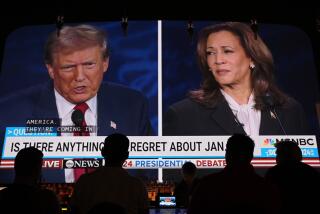Big Money Loses One
The U.S. Supreme Court’s divided but surprisingly strong opinion upholding much of the 2002 campaign finance reform law signals an overdue recognition of the power and the danger big money poses in federal elections and public policy.
Last year, Congress passed the Bipartisan Campaign Reform Act, commonly known as the McCain-Feingold law, after several tries. The measure, which applies largely to elections for federal office, aims to limit soft money -- funds raised by national political parties in excess of and spent outside of existing campaign finance laws -- and to regulate “issue ads,” thinly disguised advocacy for individual candidates. Other provisions double the cap on individual contributions to $2,000 per candidate and bar corporations and unions from directly funding broadcast ads that mention a federal candidate 60 days before a general election and 30 days before a primary election.
Groups that stand to lose influence if their deep money wells are capped immediately challenged the law. The National Rifle Assn. and the American Civil Liberties Union agree on little but found common ground in their insistence that McCain-Feingold’s spending limits were an unconstitutional limit on freedom of speech.
Wednesday’s 5-4 court decision, written by Justices John Paul Stevens and Sandra Day O’Connor, largely dismissed that argument in upholding the law’s most far-reaching provisions -- the soft-money ban and limits on special-interest advertising. The court heard the case more swiftly than usual because the new restrictions applied to the 2004 elections.
The majority’s opinion returned often to the self-evident principle that money corrupts politics. Tracing a long line from the overt patronage and graft of the late 19th century that ultimately gave rise to the 1907 Tillman Act, the court insisted that to invalidate Congress’ power to “pass appropriate legislation to safeguard an election from the improper use of money to influence the result is to deny to the nation in a vital particular the power of self-protection.”
McCain-Feingold is far from a perfect law, and the coming election season will probably demonstrate the measure’s weaknesses -- the result of the political compromises needed to secure its passage. But the high court’s clear affirmation of the measure, shifting the balance a bit away from free-speech absolutism, should provide the momentum for further reform.
A good start would be for Congress to raise the outdated, Watergate-era spending caps for presidential candidates who seek public financing -- the current caps are $45 million for the primary and $75 million for the general election -- and deny funds for the general election to those who reject those limits during the primary campaign.
More to Read
Get the L.A. Times Politics newsletter
Deeply reported insights into legislation, politics and policy from Sacramento, Washington and beyond. In your inbox three times per week.
You may occasionally receive promotional content from the Los Angeles Times.










